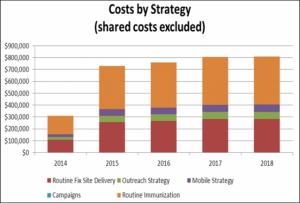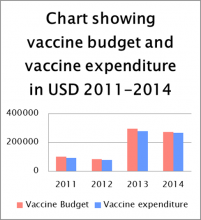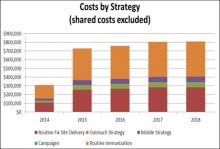Immunization financing in Seychelles
Victoria, Seychelles, 29th April 2016 - Equitable and sustainable health financing is a key component of any health system and disease-specific preventive programmes. In the Seychelles, primary health care is free at the point of use for all citizens. To efficiently deliver this service, health care is financed almost entirely through general taxation and social security contributions. The Ministry of Health (MoH) receives one of highest budgetary allocations every year. In 2014 for example MoH received Rs535,400,00. The per capita health expenditure is estimated at $485.99 per year, and this represents one of the highest in the African region. In addition to the contributions from government, the country also receives some external support in the form of technical assistance, training and purchase of some equipment from organisations particularly the World Health Organisation (WHO).
In terms of financing for its immunisation programme, Seychelles is one of the few countries in Africa that relies on its own resources to purchase vaccines. In 2014 the total expenditure (from all sources) on routine immunization including vaccine was $382,159 of which 97% was from government and 3% from World Health Organisation. The average cost per each fully immunized child in the Seychelles is $234, which is much higher compared to other countries.
Through the government dedicated contribution and that of external partners, the country has to date sustainably managed to finance the programme and has achieved remarkable progress in its immunisation programme, including a 99% immunisation coverage for most antigen. The country can be praised for this great achievement which has been due to a number of factors including high acceptance of routine vaccinations by the general population, the availability and accessibility of vaccines, and the efficient follow-up mechanisms set up within the Health Care Agency through its Maternal and Child Health (MCH) services operated in district health facilities.
One good thing about financing of immunisation programme in the Seychelles is that the MoH has a budget line specific for vaccines and supplies which cannot be diverted for other use. This ensures constant availability of resources and enhances accountability and transparency in utilization of allocated funds.
The total resource requirements of the immunization programme for the planning period (2014-2018) are approximately $1,959,738.00. The requirement translates into an average of $ 489,934.5 per annum for the programme. From 2011 to 2014 the average of MoH budget allocated for vaccine was 0.7%.
The cost profile of the immunization programme in Seychelles is that 42% of the total costs go to Traditional Vaccines, followed by Other Routine Recurrent Costs (34%) and Personnel (23%), highlighting that Traditional Vaccines remains the main cost driver.
Immunization strategies are mainly Routine Immunization Strategy and Routine Fix Site Delivery. As shown in Figure 2, the bulk of the programme is delivered through Routine Immunization and Routine Fixe Site Delivery Strategies, and only a small proportion through Mobile Strategy and Outreach Strategy. No Campaign Strategy is used in the Seychelles and this is primarily because of the high uptake of vaccination through the country’s routine immunisation programme.
______________________________________________
For more informaition, please contact:
Doreen Hotive (Mrs), NPO/HIP Officer, Tel: (248) 4224795, Fax: (248) 225754, Email: hotived [at] who.int (hotived[at]who[dot]int)
______________________________________________
Below:
01. Cost by Strategy
02. Figure 02 Vaccine budget and vaccine expenditure 2011-2014





